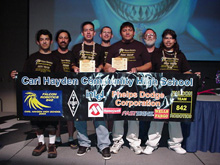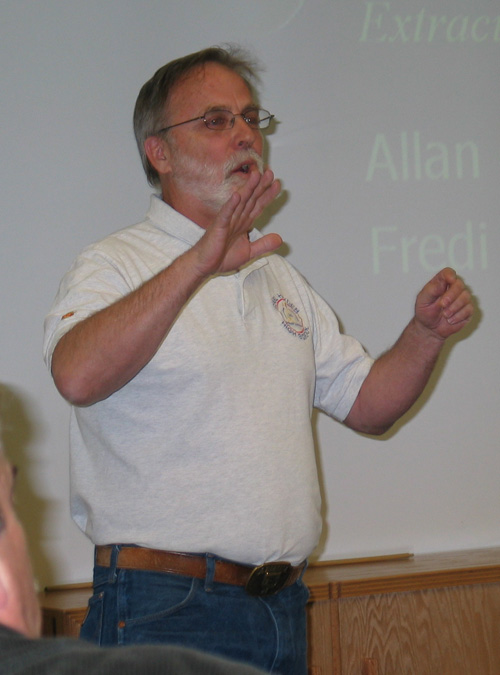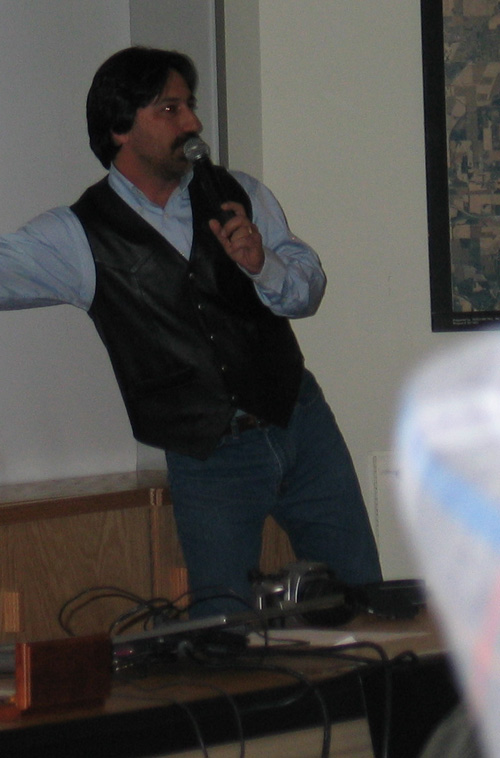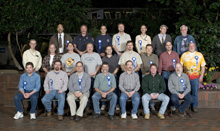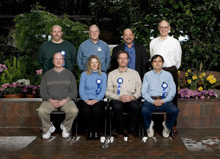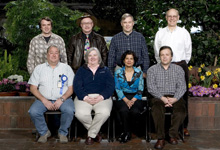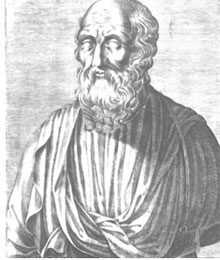 | Monday, March 20, 2006 |
|
Monday, March 20 2:30 p.m. Particle Astrophysics Seminar - Curia II Speaker: A. Notari, McGill University Title: A Graceful Exit for Old Inflation and a Solution to the Hierarchy Problem 3:30 p.m. DIRECTOR'S COFFEE BREAK - 2nd Flr X-Over THERE WILL BE NO ALL EXPERIMENTERS' MEETING THIS WEEK
Tuesday, March 21 |
|
|
Secon Level 3 |
|
Monday, March 20 -Potato Au Gratin -Monte Cristo -Savory Roasted Chicken Quarters -Lasagna Bolognaise -Chicken Ranch Wrapper -Assorted Pizza Slices -Szechuan Style Pork Lo Mein The Wilson Hall Cafe accepts Visa, Master Card, Discover and American Express. |
|
Wednesday, March 22
Thursday, March 23
Chez Leon Menu |
| Fermilab Today is online at: http://www.fnal.gov/today/ Send comments and suggestions to today@fnal.gov Fermilab Today archive Hurricane Relief Page Fermilab Today PDF Version Fermilab Result of the Week archive Fermilab Safety Tip of the Week archive Linear Collider News archive Fermilab Today classifieds Subscribe/Unsubscribe to |
| "La Vida Robot" Lecture: Really, It's a True Story |
||||
|
||||
| Sitting in 1 West during Wednesday's packed "La Vida Robot" presentation, it was hard not to make the obvious comparison to the movie Stand and Deliver. A 92 percent Latino school district with a per capita income of approximately $9,000 meets an inspiring teacher--or two, in this case. Within months, gang-banging adolescents become academic whiz kids, and perform smashingly when they compete with students who have every advantage they didn't get.
But this wasn't a movie; it was real. Even better, these undocumented immigrant high-schoolers took part in a national underwater robot-building competition where they were pitted against well respected universities. The real kicker: They won the competition--they even beat MIT. It all started with two teachers at Carl Hayden Community High School in West Phoenix. Allan Cameron, who teaches computer science, and Fredi Lajvardi, who teaches science, organized an after-school program so students could build a robot to compete in
Lajvardi says that he and Cameron decided to enter the students into the University category of the
In spite of all the attention, Cameron and Lajvardi seemed non-plused when they addressed the Fermilab audience: "We used to be known as the gang school," said Lajvardi. "Now we're known as the robot school."
For more information about the program at Carl Hayden High, or to donate to the scholarship fund or volunteer, you can visit this website.
|
| Improving procedures | ||
In a paper by Embrey, et al, 400 managers and operators were queried regarding their use of formalized procedures. For tasks perceived to be safety critical, the availability of procedures was found to be 75 percent, for problem diagnosis 30 percent and for routine tasks 10 percent. However, existing procedures were only referenced 58 percent of the time that the associated tasks were carried out (i.e., procedures were actually utilized in 43 percent of critical tasks). In follow up questions, the authors discovered a wide range of reasons that procedures went unused. The most common were (1) the job won't get done if I follow the procedure, (2) what procedure?, (3) I rely on my skills/experience and (4) trust me, I know what's in the procedure. The following are the most highly ranked improvement strategies from the paper. Consider their use to help you get the most benefit from your procedures.
|
|
March 10 - 17 - The accelerator shutdown continues Read the Current Accelerator Update Read the Early Bird Report View the Tevatron Luminosity Charts |
|
Nature, March 15, 2006: Particle physics: Let the games begin Normally, the trick to learning something at a scientific meeting is to listen to the key lectures. But one afternoon last month, in a conference room at CERN, the European particle-physics lab near Geneva, physicist Matt Strassler managed to convince several researchers that they might learn more if they left the lecture room. He wanted them to avoid hearing the solution to a puzzle they had been working on for months. Welcome to the strange world of the Large Hadron Collider (LHC) Olympics, a workshop held at CERN in which teams of theorists studied fake data in order to explore unproven theories.
Strassler, a theorist from the University of Washington in Seattle, was one of the organizers of the event, which brought together more than 50 theoretical physicists from across Europe and the United States. These 'olympians' have devoted their careers to building mathematical models of the Universe and matter. The LHC Olympics was designed to put their ideas to the test; their challenge was to prepare for the real data expected to emerge from one of the biggest experiments in physics. Strassler and his colleagues had accepted that challenge —and they weren't going to give up on their first attempt.
|
Scottish Country Dancing
Lifeguards Needed |
